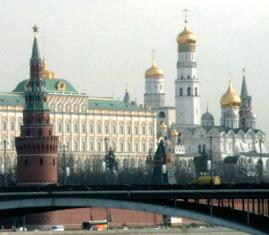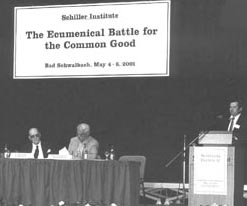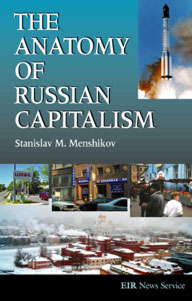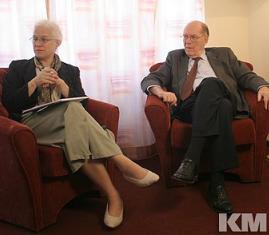
Home | Search | About | Fidelio | Economy | Strategy | Justice | Conferences | Links
LaRouche | Music | Join | Books | Concerts | Highlights | Education | Health
Spanish Pages | Poetry | Dialogue of Cultures | Maps
What's New
Lyndon and Helga Zepp LaRouche
Featured Guests in Moscow
 |
||
Russian Academy of Sciences Celebrates
Professor Stanislav Menshikov's
80th Birthday
May 2007
Russian Academy of Sciences Honors
Professor Menshikov;
Impassioned Discussion of Earth's Next 20-50 Years
MOSCOW, May 16, 2007 (EIRNS)--Two days of celebration of the 80th birthday of the prominent Russian economist Stanislav Mikhailovich Menshikov concluded here this evening with a party in his honor. The toasts offered tonight continued a wide-ranging discussion by an array of Russia's leading Academicians, other economists, and specialists in international affairs, which began yesterday during a special session held in Menshikov's honor at the Presidium of the Russian Academy of Sciences. The retrospective on Professor Menshikov's long and varied scientific career was transformed into a very forward-looking deliberation by the honoree himself, who keynoted the May 15 session. Menshikov presented a 20-year economic and strategic forecast, looking at the world as if from the standpoint of his 100th birthday, in 2027.
Prof. Menshikov first introduced to the Academy of Sciences audience his foreign guests for the occasion, starting with the American economist Lyndon LaRouche and Helga Zepp-LaRouche, founder of the Schiller Institute. He then developed alternative scenarios for Russia up to 2027, returning at the end of his lecture to LaRouche's and Zepp-LaRouche's Land-Bridge and New Bretton Woods proposals as crucial to a shift for the better.
Menshikov said that more than 50% of Russia's current economic growth is derived from burning up the skilled labor and fixed capital, created during the Soviet period. Those are "one-time" factors, meaning that Russia cannot do without new productive investment, in order to grow. President Putin took note of this in his recent speeches, Menshikov said, by talking about the need for an industrial policy. So far, Russian oligarchical capitalists do not want to make productive industrial investments, despite exhortations from Putin, but Menshikov pointed to the prospects for investment in infrastructure opening the way to a better policy. If one might expect the world's biggest economies in 2027 to be those of China, the USA, India, Japan, and Russia, Menshikov said, clearly cooperation among them is essential. In particular, he said that the LaRouche Land-Bridge program can restructure the economies of all Eurasia. This involves long-term projects, and thus the question of financing is a serious one, which can be solved through LaRouche's New Bretton Woods idea, Menshikov said. If Russia can rely on the China-India-Russia Eurasian triangle, but not forget cooperation with the industrialized nations, a "conflict-free situation" for development may be created, as against the stagnation and downturn that would otherwise occur.
Lyndon LaRouche addressed the meeting immediately after Menshikov. (Scroll down for Mr. LaRouche's remarks.) He posed the question: What do we give to the future? In a situation where practically every country in Europe to the west of Belarus and Russia is close to being ungovernable and a "failed state," LaRouche said, the need is to change the world agenda. While politicians may be corrupt or incompetent, a quality of clearer thinking is available, for example, in the USA, from among senior professionals in and around the institutions of government.
What happens in the next 20 years can be changed, LaRouche said, but the question is who will do it. Who will not only forecast reality, but change it? LaRouche noted that President Putin has repeatedly cited the legacy of Franklin Delano Roosevelt, especially, recently, in the context of the commemorations of World War II. Thus, the United States must approach Russia, India, and China, with smaller nations to be brought in subsequently, with a Rooseveltian agenda for economic cooperation. Russia's scientific culture will be of great importance, LaRouche concluded, in furthering a dialogue among senior figures from those four countries, which will establish a sense of the reality of the possibilities for large-scale economic recovery and development.
Academician Valeri Makarov, the well-know mathematical economists, chaired Professor Menshikov's jubilee session at the Academy of Sciences. Among other speakers were Academician Ruslan Grinberg, and Academician Alexander Granberg, who worked with Stanislav Menshikov in Novosibirsk, and who, last month, chaired the Moscow conference on Megaprojects of Russia's East: A Eurasian-American Multimodal Transport Link Across the Bering Strait. Representatives of the USA-Canada Institute of the Russian Academy of Sciences and of the Higher School of Economics also spoke.
The well-known former Pravda journalist Georgi Mirsky described Menshikov as a flying creature, who worked all over the world, and always shared his talent. "You could never catch up with Menshikov," he said.
Prof. Menshikov's wife, the economist Larissa Klimenko-Menshikova, as well as his daughters and other family members, were with him throughout the celebrations.
 |
||||
| Bad Schwalbach, Germany, May 2001- Lyndon LaRouche and Prof Menchikov seated; Dr. Glazyev at the podium at the Schiller Institute Conference | ||||
Dr. Sergei Glazyev, the economist who is a corresponding member of the Academy of Sciences, arrived at the meeting directly from business at the State Duma, of which he is a member. Glazyev took up the difficulties of getting people to think (the Russian word for the parliament, "duma," comes from the word for thinking) the way Stanislav Menshikov always has gotten people to think. He congratulated Menshikov on the great accomplishments of his life to date, which he said Menshikov had done, "with love for his country, and the confidence to live according to his own mind." Unlike some younger people who today are stuck in virtual reality, Glazyev said, Menshikov has already been reality-oriented, and, together with his willingness to look reality in the eye, he has provided in Russia and elsewhere a tremendous charge of optimism.
 |
||
Menshikov's memoirs, just published in Russian under the title About Our Time and About Myself, were hailed by numerous participants for providing extraordinary insights into the history of the past 65 years. The third just-published volume is a survey, by Menshikov and Tsagolov, of some cases of Russian businesses that have actually contributed to development of the Russian economy, unlike the carpetbagging described in The Anatomy of Russian Capitalism.
LaRouche's Remarks to the Russian Academy Celebration On the Occasion of Professor Menshikov's 80th Birthday:
A New Order of Relations
in the World
May 15, 2007
Mr. LaRouche spoke after the keynote remarks by Prof. Menshikov:
When you reach the age range of Professor Menshikov and I--I'm now about to become 85--and at this age, if you're intelligent, as you know, that you do not think about what the future is going to give you, you think about what you are going to give the future. And right now, on a world scale, what we require is someone to change the agenda to which Professor Menshikov referred.
We have, presently, the greatest crisis in all modern history is now occurring. There's an attempt to cover up and deny it, but it's happening. I see, most of Western Europe, from the border of Russia and Belarus westward, is a group of failed states, that are no longer capable of governing themselves, in even their domestic affairs from the inside. The world has been taken over, to a large degree, by supranational financial interests, which similar interests are doing that, to shape policy.
When you look at the politicians--and I deal with politicians, particularly in the United States--and look at them in other countries, we have not only failed states, including most of those of Western Europe; the United States is also in the process of becoming a failed state. I have many friends and sometime collaborators among members of the Congress of the United States, and other people; but I find that today, the clear thinking is not coming from the politicians. The clear thinking required for political policy is coming from a different layer, usually senior representatives of the professionals, military, intelligence, diplomatic and so forth, who step outside the small-time controversies that fascinate politicians, and do look at the future of mankind, especially senior people.
And sticking to the topic of Professor Menshikov's delivery right now, I think some things that he forecast, can be changed. The question is, who is going to change them? In practice, you take from President Putin of Russia--[he] has spoken much, with others, in these recent events, about World War II, the conclusion, and Franklin Roosevelt, and praised the Roosevelt tradition. I think that when we make economic forecasts, and they find that the forecast is not satisfactory, we say, "How can we change the forecast?" You have to change it in reality, not just as a forecast: And therefore, the time has come, to change some of the axiomatic features of currently ongoing world history.
Europe is a collection of failed states, west of the Russian and Belarus border. Therefore, the United States must change its behavior, by approaching Russia, China, and India, in order to create a new order of relations in the world, bringing all the smaller nations in to cooperate with them. I think we can do it: We can change history.
But we must rely upon younger generations coming up, in the age-range of 18 to 35, the younger generations that fight wars, to fight this war for improvement. And we must change the perspective. In that case, Russia's role, as its culture more than its economy, especially the culture of science, in dealing with the potential of the large area of Northern Asia, and Northern Eurasia, in the vast mineral resources that would be required to be developed, if the needs of China, India and other countries are to be met. This is not something that could be exported, because in Russia itself, there is a repository of knowledge of how to do this, on which the rest of the world depends.
So therefore, what I think is urgent at this time, is a program for action. First of all, intellectual action. There must be more discussion among this, particularly between leading layers of senior people in Russia and in the United States. We have it. We have to establish a sense of the reality of this possibility. In that case, we can probably win over the political process, under the heat of crisis, to recognize that this is the only alternative to what is presently the most dangerous situation in all modern history.
Thank you.

Schiller Institute Russia Page- More Links and Articles
What is the Schiller Institute?
Prof. Menshikov on The LaRouche Show
See the Berlin Conferences on "LaRouche Dialogues" Pages
Fidelio Table of Contents from 1992-1996
Fidelio Table of Contents from 1997-2001
Fidelio Table of Contents from 2002-present
Writings of Other Great Thinkers
Biography of Friedrich Schiller
![]()
schiller@schillerinstitute.org
The Schiller Institute
PO BOX 20244
Washington, DC 20041-0244
703-297-8368
Thank you for supporting the Schiller Institute. Your membership and contributions enable us to publish FIDELIO Magazine, and to sponsor concerts, conferences, and other activities which represent critical interventions into the policy making and cultural life of the nation and the world.
Contributions and memberships are not tax-deductible.
VISIT THESE OTHER PAGES:
Home | Search | About | Fidelio | Economy | Strategy | Justice | Conferences | Links
LaRouche | Music | Join | Books | Concerts | Highlights | Education | Health
Spanish Pages | Poetry | Dialogue of Cultures | Maps
What's New
© Copyright Schiller Institute, Inc. 2007. All Rights Reserved.